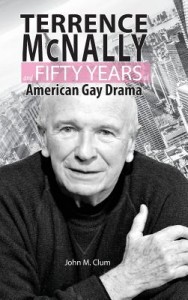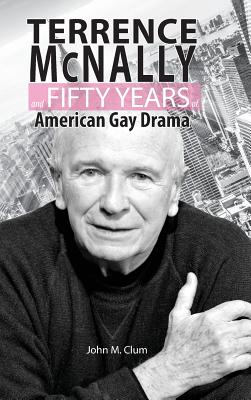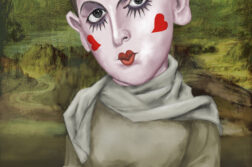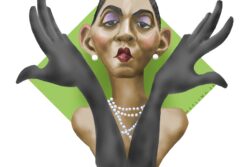 Terrence McNally and Fifty
Terrence McNally and Fifty
Years of American Gay Drama
by John M. Clum
Cambria Press. 212 pages, $110.
IN 1965, in a play called And Things That Go Bump in the Night, Terrence McNally placed on stage the first gay character whose homosexuality was simply a feature of his personality rather than a source of trauma or a marker of malevolence. Ten years later, in the wildly successful The Ritz, he dared Broadway audiences to delight in the sexual antics that occur in a gay bath house, making outrageous farce out of the comedy of mistaken identities and slammed doors previously reserved for French farces.
At the height of the AIDS epidemic, in a sequence of poetically expressive plays the likes of which hadn’t been seen since Tennessee Williams, he challenged audiences to admit that people can die for their failure to connect to one another (Frankie and Johnny in the Clair de Lune, 1987), while fear of others can cause people to erect barriers just when compassion is needed (Lips Together, Teeth Apart, 1991; A Perfect Ganesh, 1993). He poignantly dramatized the self-destructive consequences of homophobia in the short play “Andre’s Mother” (1988)—and in the subsequent development of its central characters in Mothers and Sons (2014), where a mother who has rejected her gay son because of his sexuality isolates herself not only from her son but from life itself. In Love! Valour! Compassion! (1994), McNally offered a haunting vision of how gay men support one another both in their day-to-day existence and in the face of death.
Although McNally’s gay bona fides are beyond question, he resists being labeled a “gay playwright.” In a series of talks delivered in the 1980s, he recalled the early stages of the gay theater movement, when you had to go way off Broadway, to a venue like the Caffe Cino, to see anything gay onstage. The willingness of Broadway audiences to accept gay characters began changing around thirty years ago, so that by 1996 McNally could argue in one of his most provocative essays that “Gay theater doesn’t exist anymore. There is good theater and there is bad theater. Gay playwrights either write a play as worthy of your interest … as Arthur Miller, or they don’t. You can’t get away with a bad ‘gay’ play any more than you can with serving up lousy food in a ‘gay’ restaurant.” In support of his argument, he pointed to Shakespeare’s Hamlet as “the greatest gay character ever written,” whose “over-the-top enthusiasm for the theater and actors,” uneasiness with female sexuality, and intimate relationship with his best friend Horatio mark him as such to anyone willing to read the signs. McNally concluded that until Arthur Miller is referred to as a “heterosexual” playwright, he preferred not to be identified as a “gay” playwright.
The implications of this paradoxical element of McNally’s reputation are on view in John Clum’s study of McNally as a pivotal figure in American gay drama from 1965 (the year of McNally’s first entirely original production) to the casual acceptance on Broadway in recent years of “sexually active gay men onstage.” The author or editor of such groundbreaking works as Acting Gay: Male Homosexuality in Modern Drama (1992), Still Acting Gay (2000), and Something for the Boys: Musical Theater and Gay Culture (1999)—as well as a critical study of Arthur Laurents and several anthologies of plays by gay authors—Clum is himself a seminal figure in the study of gay theater. His book was completed in time to celebrate the fiftieth anniversary of McNally’s first original play on Broadway. McNally’s career has seen the production of 29 full-length plays, eighteen one-act plays, nine musicals, five operas, and eight film scripts or television dramas. A new musical, Anastasia, is scheduled to open next April. Also in the works for next season are a new drama, Fire and Air (which dramatizes the relationship of ballet impresario Sergei Diaghilev with his erotic and artistic muse, Vaslav Nijinsky), and a revival of Frankie and Johnny in the Clair de Lune.
Clum’s approach of considering McNally’s plays in the context of the development of American gay drama, or in opposition to heterosexual-themed plays of the same period, has some advantages. I found his reading of And Things that Go Bump in the Night alongside Edward Albee’s Tiny Alice particularly illuminating, as well as his juxtaposition of McNally’s Frankie and Johnny with Lanford Wilson’s Talley’s Folly. Clum regards Frankie and Johnny and The Lisbon Traviata as “a diptych comprised of contrasting portraits of relationships. In the former play, we watch two [straight]characters move toward intimacy while in the latter work we see a [gay]relationship violently unravel. Both works deal with the sometime fraught connection between sexual passion and love.” As a self-proclaimed “opera queen,” Clum deftly unpacks the gay significance of Wagner’s Parsifal for The Lisbon Traviata and of Wagner’s Tristan und Isolde for McNally’s Prelude to a Kiss.
However, by reading McNally solely in terms of the development of gay drama, Clum risks offering a distorted picture of McNally’s accomplishments. For instance, in his desire to read And Things That Go Bump in the Night as an example of pre-Stonewall gay drama, Clum asserts that Clarence—a sweet-natured, well-intentioned but politically ineffective young gay man—is motivated by a “crippling shame [of his homosexuality]that leads to suicide.” I reread the play after studying Clum’s discussion, but I can find no evidence that Clarence is either ashamed of his sexuality or suicidal; rather, he dies accidentally while fleeing his homophobic tormentors. Nor can I accept Clum’s assertion that McNally was stung so badly by the critics’ negative reviews of this play that he retreated into using coded language in “Next” (a one-act) and Frankie and Johnny, when a play that came between these two, The Ritz, was one of the most outrageous, in-your-face depictions of gay sexuality ever to appear on Broadway. Rather, Clum might consider how Next was tailored to showcase the nervous antics of brilliantly over-the-top comic actor James Coco, or how Frankie and Johnny was not about sexuality but human connection, ending with the famous line: “We gotta connect. We just have to. Or we die.” Clum seems to assume that a playwright who’s gay is somehow cowardly not to write exclusively about gay characters.
The danger of imposing a gay grid on a sophisticated playwright’s œuvre is nowhere more apparent than in Clum’s chapter on the books that McNally wrote for musicals. Clum comments on the representation of gay characters in Kiss of the Spider Woman, A Man of No Importance, and The Full Monty, but ignores Ragtime—possibly McNally’s most successful musical and one of his greatest artistic accomplishments—because it has no gay content. Conversely, connecting Chloe’s fantasy of killing her philandering husband in Lips Together, Teeth Apart to Kenneth Halliwell’s murder of his lover, playwright Joe Orton, belies a determination to find gay connection where in all likelihood none exists.
Clum’s biography is only the second full-length study of McNally’s work to appear, which makes it especially unfortunate that such a welcome effort should show signs of hasty writing and production. In his attempt to bring the book out as close as possible to the fiftieth anniversary of McNally’s first major play, Clum misspells or gets wrong some characters’ names (Lou Nuncle is sometimes referred to as “Leo”), misrepresents the titles of plays (The Last Mile is called “The Long Road”), and gets plot details wrong (Edward is Mrs. Willard’s chauffeur, not her butler; far from being eager to leave for the retirement home, Grandfa resents being sent away). Worse, no one at Cambria seems to have copyedited the text, which suffers from numerous typos and misspelled words, inconsistently represented titles (sometimes on the same page), and chaotic punctuation. The latter is particularly aggravating when the subject of Clum’s study is a playwright whose punctuation is so exact that actress Zoe Caldwell once commented that she had no difficulty negotiating the long speeches that she had to deliver as Maria Callas in Master Class because McNally’s punctuation was impeccable.
Raymond-Jean Frontain has edited a collection of Terrence McNally’s essays on theater.






